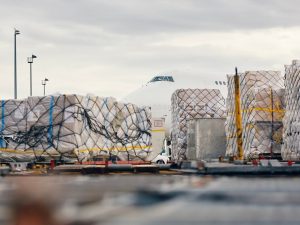Jeh Aerospace has opened its new Mach 2 manufacturing facility at Horizon Industrial Park, Kothur, quadrupling its Hyderabad footprint to 250,000 sqft. Spanning 200,000 sqf, the AI-powered, software-defined ‘Future Factory’ integrates autonomous machining, digital twins, and closed-loop quality systems, setting new benchmarks in precision aerospace manufacturing. Located within Horizon’s IGBC Platinum-pre-certified industrial park, the facility is designed for sustainability, efficiency, and resilience. Vishal Sanghavi, Founder & CEO, noted, “This expansion represents new square footage — it is the foundation of a new manufacturing paradigm that merges Talent, Technology, and Transformation.”
Read More »India set to resume air cargo services to Afghanistan
India is set to restart air cargo services to Afghanistan, officials from the Union Ministry of External Affairs confirmed during Afghan Taliban Trade Minister Al-Haj Nooruddin Azizi’s visit to New Delhi. Anand Prakash, Joint Secretary, ministry, said all preparations for resuming cargo flights have been completed. “I am pleased to announce the air freight corridors on the Kabul–Delhi and Kabul–Amritsar routes have been activated, and cargo flights on these sectors will commence shortly,” he said, signalling a step toward strengthening bilateral trade and connectivity.
Read More »‘India needs tech, talent & multimodal integration’
Tushar Jani, Group Chairman, CSC Group and newly appointed Co-Vice Chair, TIACA, outlined three key priorities for strengthening India’s air cargo sector. His focus begins with speeding up tech adoption through digital documentation, e-AWBs, and automated customs processes. He emphasised optimising India’s expanding aviation infra — 160 upcoming airports and 600 aircraft on order—by integrating them into seamless multimodal corridors. Jani highlighted the need to build human capital and operational resilience in the Northeast, which are gaining importance under the ‘China plus one’ manufacturing shift. Citing examples such as the proximity between Navi Mumbai Airport and JNPT, he stressed the importance of multimodal linkages, regulatory alignment with global standards, and the development of new cargo hubs. According to him, these interconnected strategies will enable India’s logistics sector to compete globally, driven by efficiency, innovation, and entrepreneurial mindset.
Read More »‘This approach slashes costs, streamlines the export of high-value regional products’
Afzal Malbarwala, MD, Galaxy Freight said, “Trade is highly enthusiastic about the ‘One District, One Airport, One Product’ initiative, a strategic pivot to unlock India’s logistical potential. By custom-equipping Tier 2 and 3 city airports with specialised infrastructure, we will significantly enhance cargo efficiency. This approach slashes costs, streamlines the export of high-value regional products, and drives decentralised growth, cementing India’s position as a premier global air cargo hub. Government should start implementation asap.”
Read More »‘Connectivity between tier II and III cities & cargo hubs will work wonders’
Kamal Jain, Director, Cargomen Logistics, said, “While focused export hubs are good, creating new airports without enough cargo volume will not work. The real problem is not shortage of airports — it is poor connectivity between existing ports and airports. While empty airports struggle to survive, airlines refuse to fly to the destination without adequate cargo loads. Instead, we should strengthen links between tier II and III cities and major hubs, ensure better cargo utilisation, and develop specialised product routes using existing infrastructure rather than building new airports.”
Read More »‘Govt initiative to fortify regional linkage, boost efficiency, reduce logistics costs”
CK Govil, CMD, Activair Airfreight said, “The government’s ‘One District, One Airport, One Product’ initiative could be a game changer for India’s cargo landscape. By linking district-level production hubs with nearby airports, tier II and III cities would gain direct access to global markets. This will reduce transit time, cut logistics costs, and promote product specialisation. Strengthened regional connectivity will significantly boost cargo efficiency and help position the country as a competitive cargo hub in the years ahead.”
Read More »‘Ministry’s attention will pave way for smarter cargo flows’
Arun Kumar, MD, InSynergy Supply Chain Solutions, said, “The Union Civil Aviation Ministry’s emphasis on ‘One Airport, One Product’ at the PHDCCI event marks a shift in India’s air cargo narrative. For a sector that has long suffered step-motherly treatment, Rammohan Naidu’s focused attention signals genuine intent to unlock its vast potential. By aligning airports with regional strengths, the ministry is paving the way for smarter cargo flows, stronger value chains, and a more competitive logistics ecosystem for India.”
Read More »‘This move to reduce logistics costs, generate employment’
Sunil Kohli, MD, Rahat Cargo, said, “The government initiative will position airports as specialised export hubs catering to local strengths. The scheme targets perishables and high-value regional goods such as seafood, fruits and vegetables. Dedicated cargo zones, product-specific cold storage, and streamlined customs clearance are being implemented to accelerate exports, minimise spoilage, and meet international quality standards. This tailored approach is expected to reduce logistics costs, boost export competitiveness, and generate employment opportunities in hinterland economies.”
Read More »‘Initiative to simplify cargo processes, enhance efficiency’
Balagopal Balachandran, National Head, Air Freight, FEI Cargo, said, “The “One Airport, One Product” initiative is a promising step toward strengthening India’s cargo landscape, particularly in tier II and III cities. By aligning each airport with a regional specialty, the move can streamline processes, build focused infra, and enhance export efficiency. It supports local industries and positions India toward becoming a stronger cargo hub. At the same time, the initiative will require careful implementation to avoid over dependence on a single product, ensure adequate infra, and maintain flexibility for diverse cargo demands. With thoughtful execution and stakeholder collaboration, the programme can deliver meaningful long-term benefits.”
Read More »CSMIA was honoured with ‘Best Airport for Digitisation’ award @ICA
Chhatrapati Shivaji Maharaj International Airport (CSMIA), Mumbai, was recently honoured with the ‘Best Airport for Digitisation’ award at the India Cargo Awards. Often described as the Oscars of the Indian cargo and logistics industry, the India Cargo Awards celebrate excellence across the country’s air, sea, and multimodal logistics landscape. The awards bring together airlines, airports, freight forwarders, cargo handlers, and industry innovators on one platform, recognising those who set new benchmarks in service, efficiency, technology, and customer experience.
Read More » Cargo Breaking News
Cargo Breaking News









